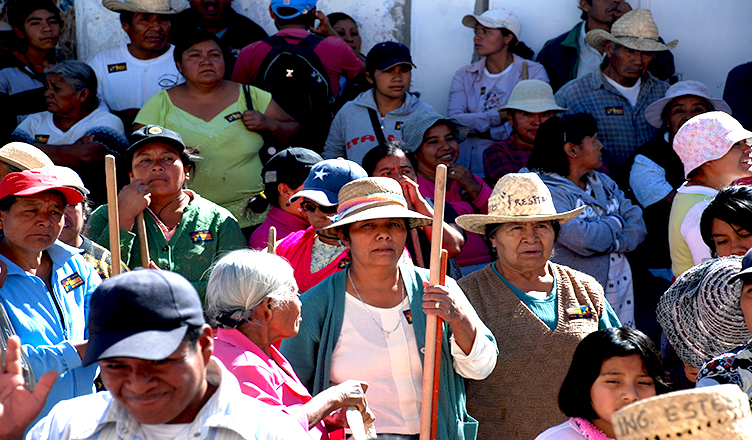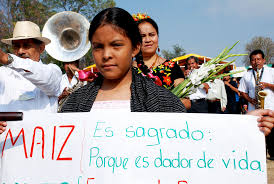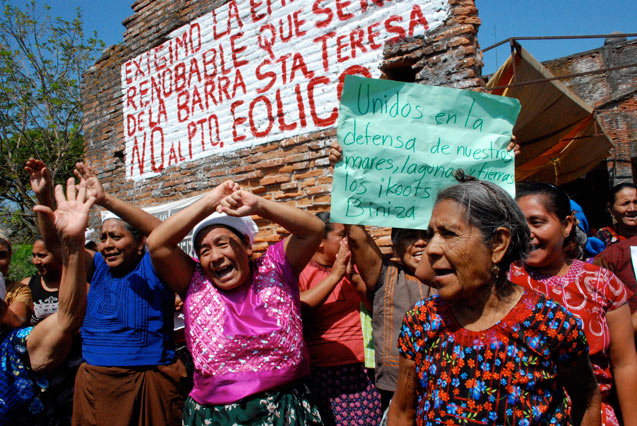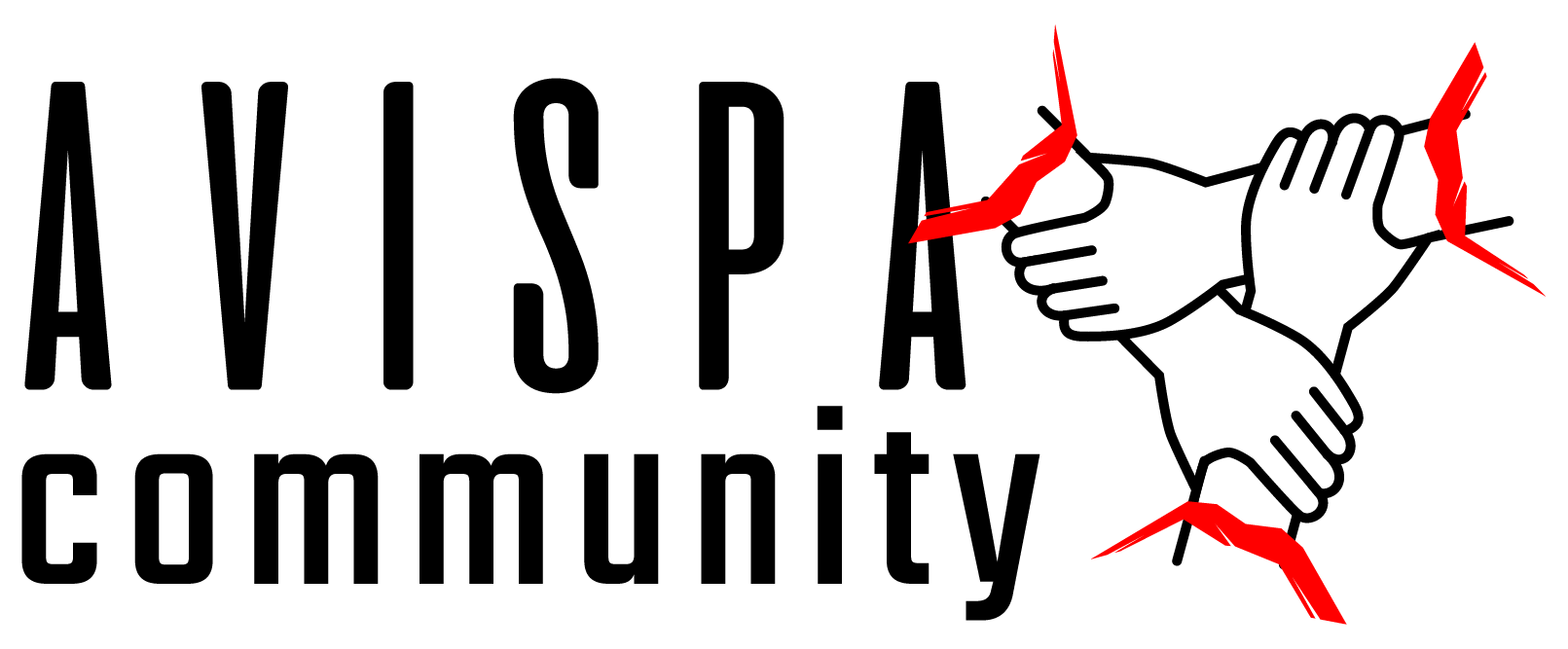The emigration of men to the United States threatens indigenous systems of governance in Mexico. When men leave, the weight of activities in small towns falls on women, but despite this women are still fighting for space in the political arena.
The system of "uses and customs" that governs 418 of the 570 municipalities in the state of Oaxaca, Mexico is based on social and traditional political practices in indigenous communities, founded on community work and assemblies that elect authorities, parallel to the party-based election system. However, these practices have faced a persistent enemy since the 1960s: emigration. In a collective system, the continual departure of large portions of a community takes a real toll on politics and lives, and the flow of people away from Oaxacan lands is leaving behind gaps in the towns' social and political organizations.
The Institute for Migrant Assistance (IOAM) estimates that around 2 million Oaxacans live in the United States; the population of the entire state is 3.1 million. In 2010, 98 out of every 100 migrants that left Mexico went to the United States. The figure on a national level is 89 of every 100 individuals. The majority of immigrants are indigenous and work as day laborers in agriculture, construction, domestic service, in restaurants, and as cleaners, gardeners and laborers. They are concentrated in Los Angeles, Houston, Dallas, Chicago, San Antonio, San Francisco, Phoenix, Fresno, Sacramento and Tucson.
According to the National Institute of Statistics and Geography (INEGI), of the 570 municipalities that make up Oaxaca, the municipality of San Juan Quiahije in the coastal region and San Bartolome Quialana in the Central Valleys are, respectively, the top two towns within the national context with the highest levels of migration.
"Oaxaca is the second-poorest state in Mexico. The minimum wage in Mexico is approximately 49.50 Mexican pesos per eight-hour day of work. In Oaxaca there are far too many people who earn less than the national minimum wage," according to the Migrant Counseling Center of Oaxaca's website. To make matters worse, when the North American Free Trade Agreement (NAFTA) came into effect in 1994, imported corn became 30 percent cheaper than local corn, which is the basis of the indigenous diet. This caused the emigration of small-scale farmers away from rural regions. The result has been the "abandonment of the countryside and rural areas and the loss of cultural traditions," according to the website.

Women from the Mixtec region of Oaxaca on their way to participate in a tequio - unpaid collective work done for community benefit. (Photo: Santiago Navarro F.)
Political Awakening
Migration away from the region has historically been predominantly male. According to INEGI, of every 10 emigrants from Oaxaca, eight were men. There are many reasons women stay behind. The risk of death in the desert or during river crossings that are required to get into the United States without documentation is one of them. The responsibility of raising children, taking care of the land and providing for the family also fall to women, especially given that they do not always receive remittances from the husband who leaves. This has also brought consequences for women who historically only participated in domestic activities within communities governed by "uses and customs."
"When the men leave, women stay and then begin to fulfill their designated cargos in schools, in community projects, in community service; even the responsibility for the survival of the household falls on women," said Carmen Alonso Santiago, an indigenous Zapotec woman and director of the non-governmental organization Flor y Canto (Flower and Song). For her, the necessity of assuming cargos (volunteer community service positions) and roles within the community is one of the principle ways that women begin to deepen their political participation. In this way, the departure of men brings greater obligations for women, but also opens greater possibilities and opportunities for the strengthening of women's emancipation in communities.
Gaining a Voice
Teotitlán del Valle is a Oaxacan town governed by "uses and customs." It has 8,000 inhabitants with a deeply-rooted tradition of weaving wool. The colorful tapestries and the clothes for cold weather are well-known in different parts of Mexico. Historically, everything was done within an artisan system, from the washing of the wool to the creation of dyes; the tradition is to make natural dyes using flowers, fruit, leaves and tree bark. Things have changed somewhat recently - some weavers use chemical dyes, for instance, but most retain the traditional methods. In large part, pieces are woven to reflect the legends and history of the community. There is no house without at least one loom and the art of weaving is taught to children beginning at the age of 10.
Seventeen years ago, a group of women from Teotitlán decided to form a cooperative, Vida Nueva. "We came together purely out of necessity. We sold our rugs to middlemen, but the pay was very low. We were single women, widows, wives of men who had emigrated. We had to provide for our families," Pastora Gutiérrez Reyes, one of the founders of the cooperative, told Truthout. "There is a lot of emigration. In the 1940s, our grandfathers started to leave, then our fathers, our brothers: The young men finished middle school and then left. Our group formed as a way to find options for work. That's how we started to work in the fields and to weave," she said.
Now, beyond just working in the cooperative, they also participate in political work with other women in the community. "We promote workshops on sexuality, health, self-esteem, and against the use of drugs," Reyes said. "In the beginning of the cooperative they criticized us a lot. Can you imagine a group of women organizing ourselves 17 years ago? Women couldn't even leave the town."
As their work grew stronger, a moment arrived when the women of the cooperative took the initiative to introduce themselves to the local authorities. "Slowly, they began to take us into account as a group of women. We began to participate in the assemblies. Other women began to see our participation. Slowly, more women came, mainly those who had husbands outside the country or who were widows," Reyes recalled. "We are now taken into consideration in the social and political realms. When there are official or political events, we are invited by the local authorities. Women can now have cargos. Men saw how women organized themselves and how their political work has good results. Today, there is a little more equality."
Limited Political Life
The "uses and customs" system has been valorized and defended by communities for centuries. When their territory is threatened, it is defended by men, women, the elderly, even children. But the political participation of women, although it has grown, is still minimal within this system. To get an idea of these low levels of participation in the state of Oaxaca, according to the State Electoral Institute of Citizen Participation in Oaxaca, during the 2014 elections, women participated in "uses and customs" systems at a rate of 1.68 percent and in political party systems at a rate of 5.2 percent.
Carmen Alonso Santiago, the director of Flor y Canto, points out that in different communities, the conditions for women vary widely because everything is based on what is determined by the "uses and customs" of each town. "There are communities where women fight for their rights, and others where they don't as much," Santiago told Truthout. "There are communities where currently it is not permitted for a woman to be elected as an authority and in other communities, there is no discrimination. In others, women are not taken into consideration to even raise their hands in the assemblies and fulfill their role in other ways. But there are other places where for many years women have participated in assemblies, voting and being counted."
Mapping the Participation of Women
Mexico's National Human Rights Commission, in its publication titled "Political Participation of Women in Mexico," based on the elections in October 2007, mapped the participation of women in the cargo system in municipalities governed by "uses and customs." This year, 361 municipalities were registered as part of the "uses and customs" system.
The inquiry demonstrates that there are several combinations of criteria that determine which women vote. In 234 municipalities (62.7 percent), all women can vote, single, married and widowed; in 59, women are not allowed to vote (15.8 percent); in 15, only married women can vote; in 5, only widows; in 10, only single women; and in 7, only single women and widows are allowed to vote. Forty-eight municipalities did not give statistics.

Zapotec girl from the valleys of Oaxaca gives a presentation in an event for the defense of native corn. (Photo: Santiago Navarro F.)
Women are part of the city council - either as members or in some rare cases as mayors - in 21 municipalities (5.6 percent). Only 48 municipalities (12.9 percent) have women members of the municipal administration as treasurers, secretaries, auditors and in administrative commissions, such as those for potable water.
Women participate more as members of committees - they appear in 195 municipalities (52.3 percent) - that have been formed through the initiatives of public institutions, such as the comprehensive development of the family, institutions in the health and education sectors, and in social programs combatting poverty. The participation of women in these types of committees is more readily accepted because they are seen as an extension of the roles women already fulfill in the domestic sphere. As committee presidents, they appear in 14 municipalities (3.8 percent) only.
Women in Cargos
Fifty-six municipalities (15 percent) register that women fulfill obligatory cargos in the following categories: religious and traditional, such as those in charge of the temple, catechists, and sometimes even serving as police, although in only six municipalities are police positions given as cargos to women.
In 64 municipalities (17.2 percent) community serviceis obligatory for women. While cargos are carried out by individuals authorized by the assembly, community service is a one-time activity that the whole community participates in, generally occurring on important days such as during festivals or collective community work (tequio).
In 42 municipalities (11.3 percent), women do services during traditional festivities; in 12 municipalities (3.2 percent) women are the organizers of such festivities. Another 31 municipalities (8.3 percent) decide the community service of women in diverse community tequios, from cleaning public spaces, churches, communal spaces, and as promoters for community programs.
According to the Human Rights Commission's report, the low political participation and presence of women within local government structures can be explained through two factors, and the contrast between the official report and the nuanced personal experiences women describe is marked. According to the report, "The structural nature of this social inequality is reflected in a rate of human development that is almost 15 percent lower than the non-indigenous population, due to the prevalence of 'uses and customs' that exclude the participation of women at high rates."
Furthermore, the report states that women's participation "in public municipal spaces can be seen as an extension of their roles in the private space of home and family, given that their roles are connected to family and procreation: education, health, collective consumption services (mills, milk stores); the same institutions that develop programs for social benefit always require this type of 'participation' by women in the community sphere."
Verónica Vázquez García, a professor in the postgraduate college in Texcoco, Mexico, who researched women's political participation in the system of "uses and customs," wrote, "women realize innumerable tasks necessary for community development, but are rarely recognized and have little decision-making power . . . The traditional gender roles not only do not change, but are reproduced daily. Women rarely rise to positions of power. Much work is needed in order to topple, one by one, these forms of discrimination that are deeply rooted in the political life of each municipality."
Rights Guaranteed by Law
On August 3, 2011, Oaxacan Congresswoman Eufrosina Cruz Mendoza, as president of the Directive Body of the State Congress, presented a constitutional reform initiative in Congress that would guarantee the active and passive right to vote for women in municipalities governed by "uses and customs" and would take steps to create a Board of Equality and Gender in all of the state's local councils. The proposal was approved on April 28, 2011.
In the State Congress, of the 42 members of the 61st legislature, only 16 are women and of these, only Cruz Mendoza is from an indigenous municipality that is governed by "uses and customs" - Santa María Guiegolina, in San Carlos Yautepec, Oaxaca.
Cruz Mendoza was elected president of her municipality in 2007 and the results were nullified based on traditional laws that stipulated that women cannot be elected to that position.

Zapotec women from the Isthmus. (Photo: Santiago Navarro F.)
The Construction of Daily Life
The system of "uses and customs" is much more than a system of cargos, of electing authorities, of decisions made by assembly. It is based on the construction of a daily life in which the role of women is fundamental. "We are talking about their own ways of living in community, of relating to one another, of educating our children, of working the land, of preparing our food, of relating to the natural world, of fighting against those who would exploit our lands. And women are present in all of these processes," Santiago said.
She defined what has permitted communities to maintain their "uses and customs" over time. "I feel that we have deep roots as an indigenous town, which has changed over time, it's true, but that is still very rooted in our values, in solidarity, brotherhood, in community work. And all this is transmitted with education and women are the principle teachers."
Santiago remembers the decisive entry of her grandmothers in the system of "uses and customs" although they didn't participate in the cargo system. "The grandmothers did not participate in assemblies, didn't speak Spanish, but have always been the advisers of the community, with their sensitivity, their intuition," she said. They were sought after to resolve internal marriage problems. They were recognized. When a mayor was elected, the authority came with his spouse, his children, to the house to talk with the grandmothers. And they called other grandmothers who were also highly respected. And the women gave their advice to the mayor and told him how he had to behave.
María Isabel Jiménez Salinas, who lives in the Isthmus of Tehúantepec and is part of the Peoples' Popular Assembly of Juchitán, told Truthout that women, like men, work to sustain life. "Around here, men fish at night, bring the fish in the morning, and women sell the fish during the day. The men rest while women sell the product. And the small-scale farmers work the land and the women make and sell the products."
In the daily life of these communities, there is equal participation of men and women, as in the sowing and in the harvest, Santiago said. The roles of communal living and survival are well-defined. "Now, slowly, political participation is drawing near. It is women who are pushing a process to raise their level of participation."


